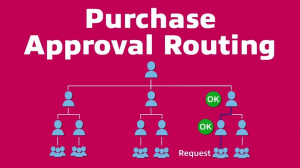Upgrading procurement departments with innovative cloud solutions is a growing trend among modern enterprises; streamlining the approval process for procurement-related documents is a big reason why. In an effort to explain, let’s examine how dynamic approval routing significantly improves procurement processes.
P2P Software Market Growth
Gartner shares some interesting details:
The procure-to-pay suite market is growing rapidly as organizations seek automation and innovation to control spend and improve supplier collaboration.
…By 2025, over 50% of the global midmarket and large enterprises will have deployed procure-to-pay suites via a cloud delivery model.
…Gartner estimates that the overall market for P2P software (including both on-premises and cloud/SaaS solutions) reached $2.4 billion in 2017. We forecast it to grow to $3.2 billion by year-end 2020, with a CAGR of 10%.
Dynamic Rules-Based Approval Routing Functionality
 One of the main pain-points in the procurement process is efficiently routing and managing approvals. Cloud P2P solutions address this with dynamic rules-based approval routing functionality.
One of the main pain-points in the procurement process is efficiently routing and managing approvals. Cloud P2P solutions address this with dynamic rules-based approval routing functionality.
Essentially, this tool allows modern enterprises to automate the approval process with unlimited user-configured rules. This functionality works to route P2P-related documents automatically to their appropriate destination according to request data and configured rules set by users.
Managing Approval Routing Complexities
Approval processes can become very complex depending on the type of industry and organization involved, yet cloud P2P solutions are dynamically designed to manage every level of complexity with automated controls.
For example:
- Automated controls allow users to configure back-up approvers and timeout rules to re-route approvals according to set time intervals
- Dynamic forms are automatically configured and routed according to request data
- Automatic emails are sent to all approvers when edits/changes occur
- Automatic emails are sent to requesters after approval or rejection
- Segmented ability to approve/reject line items or entire requests
Cloud-based P2P solutions further streamline P2P management with mobile capabilities. Mobile capabilities allow organizations to streamline the approval process with remote accessibility.
Sequential approvals no longer have to be stuck in the routing maze because an approver is out of the office, nor do parallel approvals have to hang in the balance because an approver is taking a long lunch break.
Innovative P2P solutions are helping modern enterprises manage the complexities of approval processes with dynamic automation and management tools that integrate nicely with legacy systems. These agile and scalable solutions allow organizations to take control and simplify their approval processes.
Dynamic and Agile P2P Approval Routing Solutions
Ultimately, organizations want their approval routing processes to run smoothly, efficiently, and automatically – without overspending on solutions.
This is understandable, as manually managing approval routing with limited automation controls is prone to delays, bottlenecks, re-routing complexities, communication and collaboration failures, limited visibility with audits, and more issues.
Vertically-designed approval routing solutions offer modern enterprises the dynamic and agile solutions needed to adapt, manage, and streamline their unique approval processes. From batch approvals of PO requisitions to group stakeholder approvals of budget requests, the complexities of approval routing can be simplified with automation using multi-levels of dynamic rules-based controls.
The agile design of rules-based approval routing cloud-based solutions allows modern enterprises to continually optimize their P2P processes without major disruptions. This includes integration capabilities with ERP solutions, automatic software upgrades, 24/7 customer support, and no IT maintenance.
Conclusion
Cloud-based P2P solutions are allowing modern enterprises to streamline approval routing processes with dynamic rules-based automation and management tools. Instead of manually managing approval routing processes with limited automation capabilities, procurement teams can configure routing rules to automate every level and angle of approval process complexity.
When the complexities of approval routing are simplified with automation controls, the entire P2P process will be significantly improved. This will position modern enterprises for agile growth development and continuous process optimization.
If interested in learning how ISS Group can help, please contact us for a 15-minute overview demonstration; and/or, join our session at the Spring QAD Users Group Conference this March at the Henry Hotel in Dearborn, MI.








